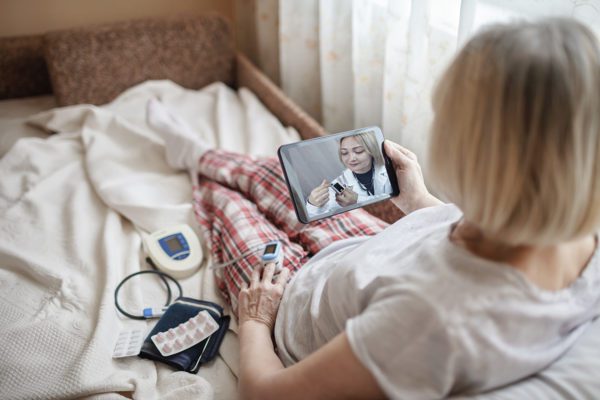Author: LouAnn Bala, VP of Strategic Product Management, GetWell
Patient care continues to expand beyond hospital walls. Not so long ago, surgical procedures were once limited to the boundaries of the hospital campus. Now, patients are more likely to prepare for, and recover from a wide range of surgical procedures in the comfort of their own homes.
Healthcare systems continue to evolve from volume-based care to value-based care systems emphasizing quality of care as opposed to quantity of care delivered. Research continues to demonstrate, empowering patients to take an active role in defining their personal health goals and participating actively in their care may yield better surgical outcomes and reduce overall healthcare costs.
Shared decision making requires healthcare professionals and patients to work together to determine the right course of care for each unique patient. This involves educating patients related to care conditions, available options, risks and benefits of treatment. In the wake of COVID-19, resource constraints have posed challenges to this model making it difficult for professionals to find adequate time to interact effectively with patients and families.
New technologies, such as Get Well’s digital care management software, enable care teams to empower patients at scale.
Initiating Pre-Surgical Care
Pre-operative preparation is vital to patient safety, achieving positive patient outcomes, and cost effective care. Every patient is different. Patient anxiety and ineffective, missed or misinterpreted communications are common reasons for delays in care. Such as:
- not having the required pre-operative tests done
- forgetting not to eat or drink the morning before a procedure
- leaving paperwork at home
- missing their scheduled appointment
Delays in surgical procedures are costly and can significantly impact health outcomes.
Using technology for pre-operative care benefits both the patient and their care team. Automated, frequent communication and needs-based interactive education is known to reduce anticipatory anxiety. Pre-operative curriculums and consistent messaging ensure the patient is fully prepared, mitigating preventable delays or cancellation to a procedure.
Providing access to a patient care portal enables patients to utilize a central location to access healthcare information, complete pre-operative checklists and communicate with their care teams. Patients can log in, input demographic information, get reminders about when to stop eating, review modifications to their medication schedule, identify who will be picking them up post procedure, and receive alerts and results related to pre-operative testing.
Care teams may access this information to better understand how patients are progressing pre-operatively and determine if there are any risks for delays or cancellations allowing for efficient workflows and best use of critical resources.
Post-Op Patient Success
Though some patients require hospitalization and 24/7 nursing care following a surgical procedure, many patients are safe to recover at home. There are many benefits of recovering at home. For example:
- a familiar environment with support from loved ones reduces anxiety and emotion distress, and enhances patients’ feelings of wellbeing
- patients are less likely to contract a hospital-acquired Infection, such as a urinary tract infection, and pneumonia
- improved rest can support the healing process without the distraction of hospital alarms can slow down recovery
Helping patients recover at home alleviates stress on healthcare resources allowing staff to work more efficiently, prioritize care, and optimize bed acuity and occupancy. However, staying connected with the healthcare team is vital to recognize and prevent potential post-surgical complications quickly. What if you could provide the same level of care while patients rest comfortably at home?
Get Well Beyond the Hospital Walls
PX Solutions and Get Well are able to extend the reach of care beyond the hospital walls. Every person deserves a personalized healthcare experience throughout their whole health journey. Get Well Loop is changing how healthcare is delivered.
With Get Well Loop, a care team can:
- engage with a patient across their care journey with automated daily check-ins
- provide educational guides, prescription information, and follow-up appointment schedules
- access a real-time window into a patient’s status and triage when necessary
- recommend in-network services
Get Well Loop also empowers your team to:
- have regular visibility into risk status
- intervene before costs and complications arise
- reduce unnecessary office visits and avoidable readmissions
- impact inbound and outbound call volume
- automate Patient Reported Outcome Measure (PROM) data capture, improving data collection rates
- enable patients to have a superior outcome and experience
PX Solutions Fuels Opportunities for Flexible Healthcare
Industries are learning to pivot from simple consumer convenience to a superior user experience with reliable, high-quality customer service. This is particularly true in healthcare. Patients are now expecting and increasingly demanding instant, patient-centered access.
PX Solutions understands that patient engagement and positive outcomes are the result of patient-centered care. That’s why we developed PX Solutions, a suite of patient-centric solutions that integrate interactive mobile applications, secure health IT and data, and optimize healthcare management expertise.
PX Solutions provides a comprehensive solution, ensuring trusted and reliable health data security, connecting mobile devices and applications, and provisioning for advanced analytics with reporting capabilities. Enabled by a team of industry-leading IT partners (such as Cisco), clinical advisors, solutions architects, project managers, content specialists, and engineering experts, PX Solutions provides the tools care teams need to help improve patient outcomes and make the patient experience better than ever before.
See for yourself how PX Solutions can help your organization connect, communicate, and collaborate towards better clinical outcomes for everyone.

